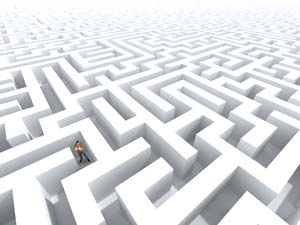Counselling For Procrastination, Deciding, Acting & Completing Things

How To Stop Procrastinating, Procrastination Cure? We can't do everything in life, though we have to prioritise, choose, make decisions, put some things off and take action. Procrastination (the opposite to procrastination - obsessively completing tasks, quickly, where reflection could be a better outcome), and having some healthy doubt can at times be a positive process, which allows us to save time when not doing irrelevant things, it can slow us down, allow for creative ideas to emerge. Rushing in & doing things straight away might not always be wise. Taking a pause, allowing things to incubate, taking time to daydream, reflect & think about the relevance and consequences can have benefits, as can good planning. This is when procrastination serves a purpose, yet our thinking, daydreaming can go round and round in circles as we ruminate and we can become anxious, fearful, get stuck or go blank, pushing things to the back of our mind. We may get stuck in patterns of avoidance which stops us engaging in relationships, our work, learning, ability to achieve what's important for us. Prevaricating, we may have developed a tendency to put things off and things begin to fester (And some of this may be related to our neuro-diversity - e.g. dyslexia, dyspraxia, ADD/ADHD, especially if we are easily distracted). When we procrastinate, have trouble starting and/or finishing things, we are delaying, postponing, what we intend to do and in this gap we may often use displacement activities to delay things further. Our procrastination problem may have become serious at times. The more stressed we are - often accompanied by tension in our body, the less we may end up doing. Yet it can become circular for us to procrastinate, because the more we put things off, the more built-up tension, stressed we feel. Indecision may follow if we don't act (see How To Stop Procrastinating - Making Choices, Indecisiveness, Decision Inertia). Just as we are on the threshold - whether we have trouble starting, achieving or finishing things, procrastination can be debilitating or paralysing at times - as if it has a grip on us, when it spirals out of control, yet another part of us may so much want to be in control (see also Power Struggles Inside Our Head). And this grip may include being in the grip of fear. When we over-think, this can affect our decision making, action taking, or worry, our energy drains, we may lose our impetus, not really live the way we would like to. Some of us may close off, shut down, bottle things up, as if also procrastinating by putting our feelings off. We allow our often good intentions to get sabotaged. We can even make up our mind to do something, and a gap appears, where things may become daunting. This daunting feeling may go back a long time or also be connected to somewhere inside not feeling good enough and can be explored in the procrastination counselling. And in this gap we may become reluctant, reticent, hesitant, hold back, stay behind, saying "It's OK to do it tomorrow" and when tomorrow comes "Not just now, I'll do it later" (see also Stop Procrastinating - Beliefs, Behaviours & Excuses). And when we keep putting things off, don't start things, we may make our excuses, look for something to blame (often us) or feel guilty, where for some it can become like a shameful secret. And both guilt and shame can inhibit change. Allowing ourself a possibility of change - believing in it and our imagination runs wild, can boost our discipline, determination to make things happen. Our procrastination and almost addictive behaviour may have a self-destructive edge and we may be seeking a procrastination cure. Disidentifying from what we need to may support us. Our procrastination can affect our life progression, work, friendships & relationships, stop us living to our full potential, alongside our low moods, affecting our self-esteem - maybe telling ourself we're not good enough. Avoiding things may go back a long way for us - we might have buried other problems, and these too can be explored in the counselling & psychotherapy. By now we may be seeking some sort of procrastination treatment and while others (or ourself) might view us as woolly, lazy, uncommitted, there may be other considerations. The counselling for procrastination may not offer a procrastination cure (we all prevaricate from time to time, from the small things we never seem to get round doing, to the more challenging ones) but explore ways of understanding procrastination, reducing procrastination, overcoming procrastination as best we can.
I like work; it fascinates me. I can sit and look at it for hours.Jerome K. Jerome
Overcoming Procrastination - Procrastinate On Saying Things We may not only hold back from doing things but also from saying things - things we have to say, clarify, resolve or communicate or catch up with others, say "Hello" (see also Social Anxiety Or Social Phobia). We may say we will do things (sometimes automatically) often meaning it at the time yet forget, don't see them through which can infuriate others at times as if we can't be trusted and this may be related to trying to please others, avoiding confrontation or conflict, struggling to say "No". The counselling for procrastination can be a space to explore what is going on for us around this, including any challenges about being authentic.
How To Stop Procrastination - Letting Us & Others Down Often we can feel guilty, maybe ashamed, self-loathing, because we have covered things up, let us & others down (maybe fear rejection), omitting certain truths or lied, believing or half-believing what we say at the time. We may have agreed to do something, but haven't done it. Our struggle with time keeping or procrastination can be interpreted by others as disrespectful and we may be seen as unreliable, untrustworthy on these issues. Sometimes our guilt in putting something off can be just as unpleasant as our dread for doing a task. Viewing what we need to do as a chore, possibly tedious or mundane (forgetting the bigger picture of why it is important, what matters to us and what we value) can stop us in our tracks. We may also forget that doing & completing tasks themselves can be rewarding. Worried what we have to face, we may loathe who we are, criticising our actions or inactions. Hating what we've done or haven't done, we may feel like hiding in a corner & giving up. We may also feel guilty when we are enjoying ourselves, relaxing, having down-time, because we end up worrying about things we haven't done. A sense of dread may weigh us down, become a heavy burden to carry, preventing us from doing things. Finding inspiration again & following it through may be a struggle. Ruminating over lost opportunities, we may end up regretting what we "should" or "could" have done, beating ourselves up even further. Procrastination help can be offered.
Nothing happens without action.Albert Einstein
Overcoming Procrastination - Fear Being Our Driver To Do Anything Some procrastinate because we freeze, are fearful, terrified (even things that should be easy can become difficult). Others only end up doing things because of our fear - fuelled by it, as if we can't comprehend the possibility of responding, acting, without our fear and it is often fear that becomes worse than the deed. (Our fear, anxieties, could be about fear of exposure, being judged, criticised, letting others or ourselves down.) The procrastination therapy & counselling can explore what lies behind our fears and the possibility of doing things out of choice, compassion.

Procrastination Help - Decision Paralysis When choices are necessary - even simple ones (or if anything becomes task-orientated) we may experience almost pathological avoidance, pushing things down the road. Everything can become an effort. We may feel out of control, become overwhelmed, frantic, when everyday "Yes", "No" decisions and responses are necessary. Fearful, yet maybe not knowing why, it can be as if our brain becomes flooded and we can't think straight, don't know how to respond to decisions, however small. We may experience numbness, paralysis at times, struggling to get going. We can go in to a "freeze" reaction, or flight reaction. Tiredness, low energy, fatigue (and certainly depression) influence our level of procrastination. We can lose hours, days, weeks. On other occasions we may go full speed ahead, with little in-between, as if we are fully engaged or disengaged. For some it may point to experiencing ADD/ADHD. Struggling to start things, some of us may procrastinate by not doing things at all (especially if we are not able to do them really well or perfectly, overly worrying we'll get things wrong, fear doing things badly). There is a French proverb, said to be from Voltaire "l'ennemi du bien est le bien" - in English meaning "Perfect is the enemy of the good", pointing towards how we can be caught up in making things perfect - the result being not getting much done. There is also a Sheryl Sandberg quote "Done is better than perfect". When we don't have the resources to do things, we avoid them & become paralysed in our actions maybe in a state of inertia, as if living half a life. The familiar procrastination routines we follow may inhibit us and some of this may be connected to past traumas. And the procrastination counselling can look at what other options may be available, including exploring how in touch we can be with trusting our intuition and inner knowing - gut feelings, hunches, instinct, improvisation
Opportunity is not a lengthy visitor.Stephen Sondheim
How To Overcome Procrastination - Making Decisions, Knowing What We Want & Clarifying Our Decisions Before we can persist with something, be determined, set our intention we may need to differentiate between what we need and what we want, clarify what we want - put our attention there, find our feeling place for it. (See also Procrastination Cure? - Mobilising Our Resources To Act)
Procrastination Help - Our Decision Making Process Some of us may be afraid of making the wrong decision and on face of it choose to make no decision. Yet from the moment of rising in the morning we are making decisions, many of them on autopilot - some intuitively, quickly, in the moment, in the context of our current reality and on other occasions, with consideration and thought, taking a long-term view. Not taking a decision, or taking a decision to do nothing, can bring us stress. Not knowing the future outcomes of our decisions, not being prepared for any possible outcomes or being judged for the decision we've made (often we are our worst critic) can inhibit us making decisions. Making decisions can be seen as a creative process involving many aspects. When choosing from options, making decisions - small and large decisions, these impact on our life and can have a long-term effect. These decisions may require careful assessment, checking if they align with our integrity, values, goals and purpose. Considering setting a time limit, putting a deadline on our decision making process, may support some of us. Weighing up our options, the advantages, disadvantages, alongside other factors which may be important, envisioning both the best and worst possible outcome and whether we feel good about a decision when visualising our future, can help move us towards deciding upon our choice. Valuing our mind (with its logical and practical processes, yet its sometimes unhelpful "Shoulds", "Shouldn'ts", "Oughts", "Musts", "Nevers", "Always") alongside our inner experience of how it feels inside (right/wrong, whether it makes us happy, gives us peace of mind) may be considerations. What's happening in our body, when we think of each decision (e.g. which one feels most right), can give us important clues which help inform us. Spoilt for options, sometimes making our decision, and aligning our energy with it, is all we need to do, that it doesn't really matter what we decide - that many of them may be better than no decision. We may just need to decide which for those of us who are sensitive, emotional empaths, can be challenging. Especially if we're not feeling at our best, we can step back from our emotions if they distort our thinking, perspective, so clarity can emerge. The counselling may also include exploring our approach to decision making, our stumbling blocks - overcoming self-doubt, rumination. Having too many options, complicating things, the unknowns, fear of making the "wrong" decisions, being overly concerned about what others think can also be explored in the counselling for procrastination. We may have certain life's predicaments, paradoxes, contradictions, conflicts, contrasts, dilemmas and at the same time remind ourselves that we have the power to choose what influences us, listening to our conscience.

How To Stop Procrastinating - Making Choices, Indecisiveness, Decision Inertia Sometimes it can feel as if we have no choices, options - we may feel trapped, clinging on to unhelpful, redundant, attitudes, beliefs, perceptions. Freeing our mind and will may be important. Whereas others may be overwhelmed with choice and it can be understandable that we are confused, overloaded with choice from the moment we wake up each day (see also Life's Predicaments, Paradoxes, Contradictions, Conflicts, Contrasts, Dilemmas). Sometimes there may be an easy right and sometimes a hard right where we need to take the long way home. Our indecisiveness can rule us, even in the simplest of tasks, as they queue up behind each other, struggling to be launched into action. Some can worry so much (what others may think of us) and about making mistakes, getting things perfect, that it stops us deciding things or influencing our decisions. Unclear inside or in turmoil we may habitually turn to others, seeking approval, validation from them, that we are doing the right thing. Overthinking, overanalysing things, our struggle to take risks & indecisiveness may be debilitating at times - indecision may rule us, putting us under pressure and stuck in our head, we may struggle to listen to & follow our heart. Gripped by fear, sometimes our indecisiveness can not only be with big decisions but about making choices for small or "simple" things, e.g. what we are going to do in the next 20 minutes, what are we going to cook, whether we get out of bed and this can impact upon our sensitivity. Afraid of uncertainty, or doing the "wrong" thing (and feeling guilty for doing so), we may not know what decision to make (and some of the decisions we make may be through guilt). Stuck in our indecision, we may feel bad, worried or stressed. Being indecisive, some may withdraw, have become emotionally closed, others emotionally overwhelmed, affecting our esteem, confidence, centredness & groundedness. When confused or unsure about making a decision we can ask ourselves "Who am I?", "What is my purpose?", "What is my intention?". Connecting to our responses lead us towards clarity. Psychotherapy & Counselling for indecisiveness can help uncover these issues alongside what matters to us, what may happen to our enthusiasm, our reasoning and the weighting we put onto things, our own life direction, so the choices we make support us and how we can support ourself in spite of what's happening around us. The therapy may also explore how we make up our mind, our conscious and unconscious processes - do we choose rationally or also include the openness of our heart, the nature of our free will, so how we see things becomes part of our choice. (See also Counselling Approach - Making Choices)

Overcoming Procrastination - Making Decisions, Making Choices, The Agony Of Choice Making decisions and not making them affects our future decisions. There are endless options, and it often doesn't matter what we decide, that making a decision is usually better than no decision. We may become overwhelmed by having too many choices. We may struggle with the range of options or consequences of choosing one. Yet we may struggle with acknowledging we can't have everything, mourning the loss of other decisions we could have made, stuck in regrets. Making decisions, making choices can be challenging, especially when our emotions are deeply affected or if we give over-importance to how others think about us. Sometimes we can feel stuck, stagnant, as if we see the world passing us by, and we can struggle making choices, making decisions, procrastinate, put things off or delay & postpone decisions. Avoiding things we don't want to do, we may continuously play out scenarios in our head. Making decisions may have become habitually onerous and any momentum or impetus gets held back. In turmoil, struggling with which option is best, we can find it difficult to make the "right" choices between alternatives or find it hard to discern between what is good for us and what isn't. We may feel in limbo, worrying so much in case we make a "wrong" decision, yet hindsight is a wonderful thing. Choosing the easy right over the hard right may become second nature. Brushing things under the carpet, our fear & the pain of choice, failure or success, burden of weighing up all the options can sometimes overwhelm us. Confused, we may struggle to let go of other options. We may want to complete something yet struggle to manage our fears & doubts about our decision - or decision-making process. Following through our intuition, ability to choose wisely, establishing what really matters for the highest good not just compromising what's convenient, comfortable, lining up our energy with our values, integrity, what we will & won't settle for, focusing our resources on this shapes our character, determines our integrity and can support our decision-making process. The counselling & psychotherapy for procrastination may also explore how free our will is when making choices, making decisions and to utilise our will to follow through our decisions & choices - no matter how difficult they are. Not everything is a choice. However, we do have choices in how we experience and engage with life, including how the meaningful choices we make shape our life - living our life deliberately.

At A Crossroads In Life - Making Decisions, Making Choices, Torn Between Choices Sometimes it can seem as if we come across a threshold, turning points, various crossroads in life with a choice to choose the route we want to take - whether or not we continue in the same direction or change direction - selecting a path of convenience - maybe one that's familiar, or a path that challenges us to courageously grow - maybe wanting to go along our own path (see also Taking The Long Way Home). Whatever choice we make we may want to choose with confidence. Making choices, making decisions can be compounded when we become very torn between which ones to make. We may have done our research, weighed up the pros and cons, yet still struggle to make a decision. Worrying or over-analysing things, our thoughts can go round & round in a loop. Wanting to stop procrastinating, we may also have a dilemma of choosing between two apparently right or two wrong options ("damned if I do, damned if I don't"). We may be faced with the challenge of choosing a "hard right" as opposed to an "easy wrong". (We may for example be faced with choosing at any moment between having to control to avoid pain, get love or to learn to be open about loving ourself.) Even small decisions can be challenging. Being in touch with our own conscience, moral compass and integrity, can support us. In our indecisiveness we can become anxious about not knowing the best outcome. We may worry, become hesitant and ponder over things, and the more we do this, the harder to make decisions and make choices. We can spend much time deliberating, which stops us putting our ideas into action. And when we have made the choice, there can be a familiar gap between what we say we are going to do and doing it. We can search for the right moment to act, but never quite find it. Sometimes we can become overwhelmed by the challenge of determining how to make the right or best decision. There are many factors to consider when we need to make big decisions - choosing the option most applicable to our particular situation and what we want to achieve, what's regressive, what's progressive. For some it can help to choose what brings us closer to our values & goals, what is of the greater good, best honours us and then act and then take action. For others, it can help to identify the benefits of successfully completing a task, having more energy & feeling less stressed. Either way it makes sense to remain calm and when we experience peace of mind, asking ourself should we do this, do that, then listen intuitively to what our body is telling us, if we then hit self-doubt, we can notice it and revisit our calmness. Either way it may make sense to remain calm and when we experience peace of mind, ask ourself should we do this, do that, then listen intuitively to what our body is telling us, if we then hit self-doubt, we can notice it and revisit our calmness. Procrastination counselling and psychotherapy for procrastination can help address these dilemmas, the role of compromise with others, what drives our life choices, decisions, unconscious elements, alongside looking at any immobilising feelings or beliefs about control, perfectionism or the unknown, etc., which stops us making decisions or making choices. (See also Life's Predicaments, Paradoxes, Contradictions, Conflicts, Contrasts, Dilemmas)
We always have choices.

Making Decisions, Making Choices - Strengthening Our Capacity To Choose, Widening Our Choices Some of us may be able to effectively help others make decisions, because we are more objective, not so emotionally involved. Stepping back emotionally, mentally from our own situation, so we are able to reflect, observe, gain perspective, consider the possibility of many ways, embrace alternative ways of seeing, doing things, expanding choices, learning what works for ourself may help us. Choosing to have trust and faith in ourselves may support our ability to choose. Sometimes in making decisions or making choices we may have limited our options. At times it is clear to us that we have a choice of only two options, yet this may not be the only way of seeing things. Choosing a different response to our dilemma of our choices may assist so we no longer make the same choices for change to happen. If we are unhappy about the decisions we have made not working out, changing our decision may be an option, and if this option is unavailable, then we may want to consider how we can make this opportunity work for us. Where we put our attention and how we choose to think can be influential. We can think & act in concrete ways, sometimes at a cost of our imagination, creativity. And when we think creatively, a range of other choices & possibilities can open up. Also, freeing ourself from limiting beliefs, opening up to different perceptions can free our attitude. What was previously unconscious, can become conscious. Fresh insights can open us up in order to act. Sometimes our choices can be reactive, and on reflection we could have made different choices. Sometimes we may be in touch with, or follow, our intuition, gut feelings. Being in touch with our intention, our power, our values & life direction can inform the quality of our choices. Acknowledging what really matters to us, and listening to that voice inside (the one free of fear), can also support us in focusing upon the choices we make, as may listening to the heart, what inspires us and our own inner wisdom. Sometimes when we are clear what choices are important to us (maybe a choice to risk, choice to love, choice to trust, choice to act) the other choices we need to make can seem easier or less of a burden. Ironically, choosing not to do something - letting go of any indifference, may free up our choice to do something else in other areas and the procrastination therapy or counselling can consider this further alongside exploring what strengthens our capacity to choose. Choosing how we experience & respond to life, so our destiny and opportunities are not just left to chance lining up our energy with our decision, may support us. (See also Our Free Will, Free Spirit)
How To Overcome Procrastination - Supporting Our Choices Breaking out of our cycle of thinking, feeling, doing, the same things begins with making different choices. Choice (and freeing our will to choose) can be seen as expressing our intentionality, freedom, free will & individuality. Challenging any redundant, unhelpful, false beliefs, exploring our convergent and divergent thinking, embracing what matters to us, choosing elevated thoughts (see also Good Feelings, Elevated Moods, Elevated Emotions, Elevated States), being in touch with our integrity, courage and the effects & consequences on us, others, weighing up the options, benefits and costs, may help support our commitment to the choices we make. (See also Counselling Approach - Making Choices)
How To Stop Procrastination - Thinking Through Our Decisions, Freeing Up Our Choice Our choices and actions may have limitations yet our choices of thought less so. Carefully choosing our seed thoughts, setting intentions can shift actions. When making decisions, we may also want to listen to our instinct, intuition, gut feelings - does it feel right and verify our feelings with logic, consider our perceptions and attitude (and the role of any rationalisations we use to support our beliefs, e.g. searching for things that support our beliefs). Noticing any unhelpful loyalties, oaths, sacred cows obligations, we may want to free up our choices, decisions by being in touch with our free will, free spirit and making a bridge between our unconscious and conscious selves. Making thoughtful decisions - seeking our truth (see also As we relinquish), checking the weighting we put onto things may be important for us, to think clearly, weigh up the options, alternatives, so we can make the best decisions in that moment. Yet it may also be important to make swift decisions by not thinking too much, putting a time limits on our decision making process, acting upon our decisions. Yet deciding how to decide and decision making can be complicated, so setting a time limit on our decision making process and clarifying if we need to make a swift decision or think things through can help as may determining whether we take a short or long term view, alongside considering whether we involve others or make our own decision.(See also Counselling Approach - Making Choices)
Making Conscious Choices We may also want to live from our heart, making our choices consciously, with full awareness - ones that nourish, or bring fulfilness, happiness to us and others, when our actions are aligned with what is called karmic law of cause and effect and be accountable for our choices now and these influence our future. And when in touch with our intention, this helps us focus on making choices.
Overcoming Procrastination - Involving Others In Making Decisions We may be faced with a choice of whether and how to involve others in making decisions - especially if they are affected by the decisions, yet in doing so they can feel more valued, involved. This can also improve the overall decision-making process because of the different knowledge and skills. Often it makes sense to include people who are impacted by the decisions and those who are implementing them. This can increase people's engagement and responsibility, including their perspectives, which can lead to better outcomes. However, the decision-making process can be slowed down, take up time and resources because of different personalities and opinions. The therapy for procrastination can be a place to figure out when and whether to involve others in decision making. Some of us have found the following framework helpful to make informed decisions, choices:
- High impact & Low risk
- High Impact & High Risk
- Low Impact & Low Risk
- Low Impact & High Risk
Time Management Counselling, Time Management Therapy

Procrastination Counselling - Frequently Late, Doing Things The Last Minute, Moving, Pushing, Breaking Deadlines A sense of time blindness may affect us. Pushing deadlines & doing things the last minute can work for some, energise us, motivating us to do things - consciously or unconsciously, giving us an adrenaline buzz. (For some of us, fear can be our driver and we can believe we need this last-minute pressure to do things and this at times can work for some of us.) Having less time for us, means we are less likely to get distracted, more likely to get things done faster. We may enjoy working under last minute pressure, which on the face of it can make us work better. Yet setting tight deadlines (see also Timescales), completing things by the skin of our teeth may not always be our preferred way and can put unhelpful pressure on us, be anxiety provoking and we can become super-nervous, yet our body may be so used to this threat, we know no other way, especially if we get anxious about arriving early (what would we do with our time?) and the psychotherapy for lateness can explore this further with us. Doing things the last minute can have advantages, as it can help us focus & be creative, get things done (some of us may thrive under this pressure, believing we always need this to give us momentum). It can be exhilarating, exciting, a place where we find our passion. (We may pretend to others that our lack of punctuality is an amusing, charming, quirk, that we are simply terrible timekeepers, that others should just relax.) Yet some of us may struggle to complete things in our own good time and end up rushing the last minute. Believing we have more time, we may follow our urge to be late, move, push or break these deadlines, trying to squeeze a bit more into doing things the last minute, which can mean we miss appointments, social situations, planes, trains, etc. - even magically believing that if we are worthy, trains, planes would wait for us (see also Anxiety & Keeping Busy With Distractions, To-Do Lists). Having a deadline may fill us with fear, apprehension or dread, which can immobilise us and the task can then become a burden (see also How To Overcome Procrastination - Making Time For Things That Matter, Time Management). Our mind and body may want to run away from what we need to do, or we may freeze. Ruminating, whatever deadline we are given, we may always try to push it out or break it. Under pressure, we can also create stress for others. Our actions & non-actions may inconvenience, frustrate & disrespect us & others. It is as if we can't bear having to do things, being given deadlines (we may sometimes view & respond to them as ultimatums), that anything we are compelled to do, we have to react or rebel against. It can be as if we can't face doing things (even procrastinating on leaving our home each day), then when we have to do it, we do it (or even then not do it, despite adverse consequences). Sometimes, certain events or external elements, may force us to act. We may only finish things because we have to do it, based on externally imposed time scales. We may struggle to prepare and put our own time structures and timescales into place, find our motivation or ways to complete things when it suits us. "Why prepare, when I can do things the last minute" may be our response (see also How To Overcome Procrastination - Planning Our Goals). Frequently we may put off things until there is a crisis or emergency. Procrastination help can be offered in the counselling & psychotherapy.
When Someone / Our Partner Frequently Changes Plans The Last Minute We can understand when people change things the last minute, accept this, even enjoy it at times. Yet other times we may need to lay down some boundaries, e.g. "I notice you change plans the last minute often. I don't like it, so I'm going to stop making plans ahead of time with you. I enjoy being with you and making spontaneous plans in the moment, but not future plans. If you still want to do things on future dates and I don't have any other plans then I'd love to get together."
How To Stop Procrastination - Chronic Lateness We may go into a different time-frame in our head as if we are watching ourself from afar, absorbed in what we are doing without checking the time or properly preparing our journey - in our head yet not present, always be a little or a lot late for things (as if we are compelled to be). Others may be chronically late as a way of expressing our need to be in control (or because part of us feels out of control). Yet ironically it may be our chronic lateness that is in control. Sometimes turning up late can be important for us, so we don't suffer the anxiety of being early, what to do with our time. And for other people, our lateness may feed our own narcissism - our importance of being somewhere (that we are needed and get attention), that this need is so great that we choose to turn up late. Some may be chronically late as part of our passive aggressive behaviour or as if we have a rebellious streak running this part of our life (see also Power Struggles Inside Our Head). However, many of us are chronically late for a variety of other reasons - often unconscious (e.g. as a possible manic defence) or brought on by our magical beliefs. Depression, anxiety, ambivalence for some can play a role. Struggling to extricate ourselves, and pulled towards distractions, we may always have one last thing to do. When allowing ourselves time to arrive somewhere, we use an inaccurate accounting system (things may take longer than we forecast) without allowing sufficient extra time for the unexpected. Time management skills alone may not help us, for we may first need to address the impact of our history around lateness and the pay-off and gain of being late (maybe the part of us who wants to be late and doesn't want to do certain things), and therefore search for counselling for chronic lateness. We may spend much of our time worrying, panicking, feeling guilty or worthless for being late, yet can't seem to change this. Our chronic lateness causes frictions in our relationships. We may have a library of justifications, reasons, excuses, be polished in making them sound reasonable. We may have an unrealistic optimism about the time we have ahead of us, so when running late for things, we may want to set reminders ahead when it's time to stop what we are doing, start and prepare to leave, and realistically plan, avoid leaving things to the last-minute allowing time for the unexpected and communicating clearly to others if we are running late - showing we respect other people's time as well as our own. We can let fear of deep emotional connection, intimacy force us to be late. The procrastination counselling for lateness can explore this further.
Overcoming Procrastination - Cramming Things In, Perpetual Lateness, Punctuality Problems We may have a habit of cramming as much as we can in or panic at the thought of being early, fearful if we are the first to arrive. What will we do with our time, we may ask. Persuading ourself there is plenty of time (and not allowing a cushion for unexpected things, delays), we may tend to have an unreasonably optimistic outlook of how long things take, cram thing in the last minute, waiting until there is very little time left. We may tell ourselves we are at our best when under pressure and have to prove this by cramming things in. And just as we are about to go, we may find something - some distraction, however small, because we find it hard to leave. Lateness may have become our default. (Some of us may fear being late yet somehow a negative or sabotaging response happens, creating things to make sure we are. "If I'm early, I'm wrong" may be a belief.) Firefighting or being late for most things can add to our stress, which could be compounded if we become easily scattered, chaotic, disorganised, and struggle to create order or say "No", drawing lines when we need to. (Especially if easily forgetful, scattered, some of this may be linked to our ADD, ADHD.) Over-estimation of the time we've got (and under-estimating the time it takes to do things), we would like to believe we have more time than we do and get surprised or panicked when time catches up with us. We may have constant feeling of running out of time, which makes us anxious or overwhelmed. (Some of us may put the time forward on our clock in the hope that this gives us more time, yet our lateness persists.) Sometimes we can tap into what springs us into action & gives us energy, yet our usual pattern may be different. We may struggle to plan, allow time to prepare (building in time for delays), including getting up on time in order to be punctual. Because we don't want to do certain things, we may become angry at the world, or almost wanting danger, chaos. We may tell ourselves "What can I get away with?", "Is there anything else I can quickly do a bit more of first?". When we prioritise punctuality, our stress levels may lower, when we no longer put ourselves under unnecessary pressure. Taking things and time to brinkmanship, we may have an unusual concept of time - a time blindness and would rather not make a choice or act, and if we do, it may be at the last minute, being forced upon us by an urgency, external circumstances or if we come up against something unavoidable, and even then we may not do things. (Bedtime procrastination - getting off to bed late at night, giving ourselves permission to go to bed earlier, or getting up in the morning, may be difficult for us - see also Sleep Problems, Insomnia). Counselling for lateness can be offered. Control may also be important to us, yet a part of us may feel out of control (see also Power Struggles Inside Our Head). It can be as if we have abandoned our self, which can be explored in procrastination counselling & psychotherapy, alongside how we value & manage time, respecting ourself and others - our time (see also Concept Of Time, Timelessness, Time Passing) and theirs. (Yet a part of us may have a contempt for time - it is as if time is the enemy.) The counselling for procrastination may work with valuing ourself, recognising that our feeling self (inner child) feels safe if we make commitment to doing things, are not late, reducing our inner child's stress, anxiety and this can give us a sense of inner peace. But first we may need to address what the payoff is for us to our chronic lateness (we may enjoy the attention we get arriving late or can't bear arriving early, because we would get anxious or there is so much we can cram in before we leave and beside we enjoy our freedom). We may also need to explore what we tell ourselves the excuses we make to ourselves and others, e.g. "If I fail it's because I didn't give myself enough time". This may be linked to having an authoritarian voice inside of us telling or bullying ourselves that we must arrive on time and another part of us in resistance, who refuses to obey this, won't be restricted, or controlled by linear time. Our conscious and unconscious intentions can also be explored in the counselling for lateness, therapy for lateness.

How To Overcome Procrastination - Making Time For Things That Matter, Time Management Procrastination can rob us of our time, stop us living our life fully. Sometimes it can seem we have so much to do and have to do it all ourselves. We can unhelpfully keep ourselves busy with distractions, to-do-lists. We can lose a sense of time and managing our time differently may be challenging but first we may need to explore the relationship between our perceptions and attitude. Our attitudes & beliefs about time can greatly influence how we live and the counselling & psychotherapy can explore these with you. (We may tell ourselves we don't have enough time and believe this, which becomes a self-fulfilling attitude - creating scarcity of time and stress. Or we could tell ourselves we have the right amount of time we want and need to do.) Our relationship to time, whether we view time as our friend - that we respect it and make the most of it, or our enemy (that there is not enough time, time is not on our side, and it works against us) influences our procrastination. All of us have thought we don't have time to do things, and it may be true that we don't have time to do everything. Yet often we can get caught, getting distracted, spending time on things that don't really matter, especially for difficult tasks. We may be stuck in the past, present or future. Some may be frequently late, do things the last minute, move, push, break deadlines. Time management skills, re-choosing to spend our time elsewhere, identifying our time wasters - minimising, eliminating them, prioritising what matters, making more time for what's essential, meaningful, valuing our time, making good choices how we spend it, building & maintaining supportive habits, seizing the moment & in touch with our purpose, putting our focus & attention where we need to without distractions, can be important for some. For others, valuing ourself and therefore our time, who with and how we spend it may be explored. This for some may mean timeboxing, a time management technique (e.g. Pomordoro), which allocates fixed time periods - a time box, where our planned activity is scheduled in our diary, when it begins and ends. Counselling for time management may be a need for some and this may include addressing any esteem issues, feelings of insignificance, believing that maybe our time doesn't matter, that we don't feel valued so why should we bother turning up, doing things. Also addressing any narrative from our past (e.g. it's OK to be late), having fresh anchor points, motivations, rewards, to support us may assist, as may being mindful, conscious of the present moment.
Only put off until tomorrow what you are willing to die having left undone.Pablo Picasso
Timescales We may struggle with deadlines. "If it's not urgent - leave it, I can't be bothered" may be responses. Some of us may have a different internal timeclock, concept of time, which can work for and against us. Being realistic, building in cushions for delays, unexpected problems, may help us feel more at ease. Tuning in to what gives us impetus, allowing for the full length of time things will take, creating a realistic workable timescale (which sometimes needs to be agreed with others), with specific dates for all our detailed activities, goals, plans and tasks to be completed can support us as can marking the ones we've achieved, responding to the ones we haven't. Starting things can give us momentum. Setting times for separate tasks to be completed may assist and rather than trying (which we have done a lot of) we may need to make different decisions.
Overcoming Procrastination Counselling, Overcoming Procrastination Therapy

How To Overcome Procrastinating, Postponing & Putting Things Off - Our Mantras We may get into a habit of putting things off (especially things we don't like or enjoy doing), postponing for as long as possible. Putting off sleep may also be a concern for us. Not only do our actions have consequences, so too do our inactions. Hiding or running away from things, we may seek procrastination help now, because it's been blighting us for long enough. "It's not quite the right moment" may be our mantra. For some we can be OK in certain situations, e.g. work, yet not in our personal life. "I could, but I'll wait a bit longer", "I'll just wait till...", "I'll do it later" or "When the time is right", "I won't do it, complete it", "I can get away with it" (not doing it) may be our familiar mantras (see also Stop Procrastinating - Beliefs, Behaviours & Excuses). Putting off anything difficult or challenging, the voice at the back of our head may persuade us "I'll just do this/that first - there is plenty of time". We will put things off under our illusion that they will get done some day, yet small things pile up & accumulate. Over thinking, we can imagine outstanding tasks much bigger than they are, which can become onerous, overwhelming and tiring for us. Depleted, most of energy can be expended on thinking of the daunting consequences of our actions, rather than acting. We may waste time, or struggle with the concept of time, as if our past, present & future merge into one. Making time for things that matter - time management may help us. Ironically, our thinking, stressing, procrastinating & doubting time may well exceed the time it takes to complete many tasks. Inside we can be in a tug of war, or feel a crushing, cumulative pressure of time, which affects our ability to make choices or decisions. Making any important decisions may become difficult. We may struggle to postpone our unhelpful thinking patterns, negative thoughts or have powerful separation anxieties, which may be linked to our early bonding patterns (see also Releasing Ourselves & Letting Go). We may now be seeking procrastination help and be more in the moment so our energy is freed up to put workable strategies in place, addressing each task at hand.
Overcoming Procrastination - Choosing Whether Or Not We Quit Things Sometimes quitting things is the right choice. However, at the first inkling, when things get difficult or tough, we may readily quit & walk away from situations, which we can't really avoid, because invariably we meet them later on. We may be putting things off only temporarily. Being honest with ourself why we do this, acknowledging our triggers, working towards changing this, building up our strengths, so we are able to overcome similar situations, may be important. Counselling for procrastination can support with this.
You can't build a reputation on what you are going to do.Henry Ford

How To Overcome Procrastination, Putting Things Off - Knowing What We Really Need To Do We may have a mental block or a bit of a monkey mind. The small things we have put off in the hope that they might go away, may have become bigger and our responsibilities pile up. Struggling to stay on top of things, we may have let things slip in familiar, ingrained ways. There may be things we need to say and do (ranging from small things, like opening the post, to making big decisions and taking actions). And if we do start things it might be too late or we may fall back to our familiar place of not finishing them. We may also secretly hope people value us more for being indispensable. Most of us don't like doing stressful or unpleasant tasks, and we would like to avoid them forever by choosing pleasurable tasks and having fun. Some of us even put off doing pleasurable things, struggling to get things off the ground. Despite our procrastination, many of us know what our dreams are and exactly what we need to do, that when it comes down to it, we have the capacity to be fully engaged and do what we need to do. Others may have become a bit of a dreamer, struggling to focus. Procrastination Counselling & psychotherapy can help go into our own procrastination issues and ways of overcoming procrastination, exploring what gets in the way of our momentum.
Avoiding your triggers isn't healing. Healing happens when you're triggered and you're able to move throughVienna Pharaon
the pain, the pattern, and the story, and walk your way to a different ending.
Procrastination Help, Triggers For Our Procrastination Getting to know our personal procrastination triggers, distractions, and having a plan to manage these may support us, so we don't feel so overwhelmed. Our procrastination triggers may include:
- Certain tasks, events
- When coming up against difficulties, living with what's unknown
- Daydreaming
- Losing our time in familiar distractions, which takes us away from our focus
- Disorganised lifestyle
- A habit - that's what we've always done and we always will
- Certain parts of the day (which can end up becoming the whole day)
- Making things unreachable, too important, or putting things on a pedestal
- How we receive & interpret things in a certain way
- How dare the outside world try to control me (so I may become passive aggressive by procrastinating)
- The belief that we have to oppose everything, rebel
- Taking rather than giving
How To Overcome Procrastination - Benefits Of Procrastination Putting our life on hold, our procrastination problem can go back years. Our procrastination helps us detour around things and be vague. Procrastination allows us to see both sides of the fence (see Overcoming Procrastination - Sitting On The Fence). It can be our seductive friend, enabling us to bypass our feelings and not to acknowledge our uncomfortable feelings or depression, respond to difficult people or chores, putting them in the "Too difficult" or "Not now, later", "At some point in the future" box. We can get seduced by the familiar message in our head, which tells us we don't have to do the things we don't necessarily want to do. We can imagine our "to do list" far out of our mind, as if doesn't exist. It doesn't threaten us. If we ignore things, we can be free of worry with temporary relief, and at ease. It can be a pleasant feeling to sit with the idea of doing something - elongating the feeling of just about to do something. Procrastination is our familiar comfort zone, yet can be experienced as an altered state of our reality. We know how to do our procrastination well, doing the bare minimum to just get by (see also Utilising Our Mind - Controlling Our Thoughts Affecting Our Actions). We don't have to face the fear of making decisions (see Overcoming Procrastination - Making Decisions, Making Choices, The Agony Of Choice). Procrastination can give us the illusion of control, choice, and we don't have to worry about failing, succeeding. No one will tell us what we should do, and when to do it (not even us). Our procrastination can give us the illusion of safety. (We may struggle to feel safe inside.) Fearing failure (or success) or being visible - showing up, we don't have to take risks or responsibility. (We can for example persuade ourselves and others it's not that we failed, it's that we just hadn't enough time.) Before we can work out how to stop procrastinating so much, we may also need to acknowledge what the benefits are.
Stop Procrastinating - Beliefs, Behaviours & Excuses Procrastination is a behaviour - an action & can become our automatic response - a reaction, as if we have no other path to take. At the beginning of the day we may believe we will not fall into our old habit, yet we can fall back into our familiar ways of procrastinating, so we don't feel challenged or scared. Alongside any sense of dread, impending doom or a tendency to catastrophise, beliefs about ourself (e.g. it's going to go belly up, or we don't deserve things going well), can originate from our past (see also Self-Esteem, Confidence, Criticism, Insecurity & Assertiveness). This may limit our motivation, choices and ability to complete things. We may also have expectations about how things are supposed to be. Our negative thoughts & beliefs (e.g. believing there is only one right decision), alongside our emotional reactions (e.g. "I hate doing this"), contribute towards our procrastination. We will do anything else - any distraction - however small, apart from the one thing that we should do or need to do. These can then pile up, as may our invalid excuses, which disempower us. We may become overwhelmed and immobilised, frozen inside with so much to do and little time to do it in (see also How To Overcome Procrastination - Making Time For Things That Matter, Time Management). We may make what we want to do or where we want to be so huge (see also Our Perceptions, How We See Ourself) that it becomes daunting, as if we are kicking and screaming when thinking about or doing tasks. Some of us may rush on - full speed ahead, and then collapse, procrastinate until our energy returns. We may regret saying yes to things, starting things, because we lose our focus, dedication & passion. Some of us may compartmentalise things as a temporary way of coping. The narrative of our procrastinator inside of us may persuasively kid ourself or others by saying, believing:
- I haven't got the time
- I'll get round to it, as soon as ... (yet we don't).
- I'll just finish other pressing tasks first (yet these tasks may also not get done).
- I'll do it later, when my mood is more creative.
- I can't deal with this now, I'm too busy, I'll start it tomorrow.
- I can't find the time.
- I'll stop procrastinating in a minute
- I forgot.
- It's bound to be unpleasant.
- If I ignore it, go silent, it will go away.
- What's the point? I won't finish it anyway.
- He or she is not telling me what to do, so I'm not going to do it.
- I'm not as uptight as you are.
- I'll just do the fun & interesting things first.
- I'll become disorganised, so I can't work out where to start.
- Even if I did it, it won't turn out the way I want.
- I haven't got the skills
- I'm not good enough
- I won't do it right.
- It doesn't feel right.
- There is more to life than working, doing this unpleasant thing.
- I don't know what to do.
- That by half-heartedly agreeing to do something yet not doing it or saying "I know" it will go away.
- The demands, uncertainties & responsibilities are too much.
- I'm lazy, stupid, irresponsible, worthless & uncaring and want to stop laziness.
- I'm not lazy, I just prefer to enjoy things.
- I'll distract myself by keeping busy or preoccupied.
- I am unable to get over past disappointments.
- It's bound to be disappointing.
- It's not my fault or I don't have to take responsibility
How To Stop Procrastinating - Want To Stop Laziness Laziness (or not being bothered) can often be confused with procrastinating, struggling to prioritise things and the counselling can support us in seeing what else may lay behind can't be bothered, the label of laziness, being lazy. (There may be a back-story to our so-called laziness, taking it easy, whereas others may experience Dyslexia, ADD/ADHD.) We may want to stop laziness. So-called laziness, can't be bothered is often connected to being blocked in some way and the therapy can explore what our own personal blocks are. Others, who always believe they have to be busy, may want to do less, simply be in the moment.

Procrastination Help - Our Response To Others If our procrastination is spotted by others, we may try to distract them by changing the subject or laugh it off. We may find ways for others to lower their expectations of us or get them do things for us. We may have developed ways of charming them, and when this doesn't work, we are at a loss. Struggling to be direct, express what we need, we can become well practised in negotiating for more time, apologising, bending the truth (or lying at times, saying we will do things or have done things when we haven't) & avoiding tasks to get us out of sticky situations. We may struggle to respond directly to people's messages, or doing things we said we would, and the later we leave it, the harder it is to get back to them. We can then feel worse, further trapping ourselves in inactivity. We may have let others down, feel embarrassed, ashamed (see also How To Stop Procrastination - Letting Us & Others Down). Sometimes our procrastination problem may be connected to directly saying "No", rather than find ways round this. Ambivalent, we may go along with things, yet not really be interested, fuelling our apathy. And when our heart, passion, isn't in something, this may partially explain our procrastination. We may not want to upset others, our partner, not let others down. We may try to be popular, liked, rescue or please others, promising we will do things, even if they are unrealistic - and there may be a part of us that actually doesn't want or need to do certain things (this can open us the space to what we do want, need to do) (see also Procrastination Cure? - Double Binds). Ironically we may let others down anyway, and may get into all sorts of trouble. We may continue to apologise, yet our procrastination continues. When it comes to changing something about us, or putting something into action, we may not only experience internal conflicts (what happens inside us), but also fear conflict with others. Procrastination therapy can look at how procrastination plays out in our responses to others.
Committing To Things Alongside wanting to stop procrastinating, overcome procrastination, we can hold on to unhelpful beliefs, worry about scenarios - usually worse case ones, which can be like a crushing energy. We can struggle to commit to things, decide things, make choices and then act. We may have problems making, keeping appointments (see also Overcoming Procrastination - Cramming Things In, Perpetual Lateness, Punctuality Problems). We can initially be optimistic about things, yet this dwindles, as we become uncommitted. Some of us may struggle either making appointments or honour appointments already made, letting us or others down. We may like to keep all our options open - right to the last minute, so we can tell ourselves "we have the freedom of not being trapped" and "we are bad at making decisions" or "we are lazy". We may only want to think in the short term, and not about our future. Our hope may be in short supply. And besides, we like our familiar, risk-free comfort zone, we don't want to hurt others or us, avoiding conflict at all costs. Committing to keeping appointments or making them may be one struggle, and a further struggle may be to do what we said we were going to do. Our commitment issues may not only affect our progression, our work, our friendships but also career decisions, commitment phobia (or indeed with difficulties ending our relationship). We may also struggle with commitment issues in relationships. Procrastination therapy can help bring to light what else may lay behind difficulties committing to things, so we can stop procrastinating.
Overcoming Procrastination - Sitting On The Fence We can be comfortable sitting on the fence, as if we are doing nothing. We may even believe we won't have an impact if we don't decide something. We may enjoy the detachment from sitting on a fence. Fence sitting allows us to sit both sides, yet we may find it hard to come off the fence ourself & be proactive, unless we are pushed. Choosing to come off the fence may be challenging, and get in the way of us wanting to stop procrastinating.
Showing We Care Or Don't Care Some of us try so hard, care so much, yet are trapped. Others may find it hard to show that we actually do care, continuing to maintain a laissez faire attitude - that nothing really matters, which masks what's really going inside. We may try not to show to others how much our procrastination really affects us. Procrastination therapy can help uncover these procrastination issues with you.
Procrastination Help We may be seeking a procrastination cure, wonder how to stop procrastinating. After a while we may realise that our procrastination doesn't get us where we want to. When we procrastinate, it can seem as if we are coasting, drifting (often into our own world, finding ourself doing something else, yet wondering how we got there), switching off, hiding & withdrawing - our confidence & esteem can plummet, as we compare ourselves unfavourably with others. We may judge ourselves as cowardly or stupid, whereas in fact we may struggle with finding a way through being anxious. Becoming overwhelmed, out of control at times, we may be stuck in our head or develop "all or nothing" thinking (e.g. right/wrong, good/bad), which stops us. We may turn any anger inwards or onto others. Dawdling, avoiding what we really need to do, putting things off & cancelling things may not only affect us, but others around us, letting people down or backing out of things. People may end up giving us ultimatums. We may feel powerless to change and may feel helpless like a victim. And if we are martyr-like we may want to delegate tasks to others. Coming from our wounded, fearful self, we may have lots of reasons why things can't be done. Counselling & Psychotherapy can help with overcoming procrastination, deciding, acting and completing things. The counselling may also allow for your fears, beliefs about how things will turn out, past pain & hurts, your "inner chatter" & doubts, perfectionisms, confidence, beliefs about who you are, sources of motivation & support systems. Counselling for procrastination can sit down with you and find out what procrastination help might be needed.

How To Stop Procrastination - Abandoning Ourself Organisationally Disorganised, Being Messy, "Addicted To Clutter", Maybe Chaotic At Times Organisation helps us keep track and prioritise things, categorise information, manage our time. Some of us may refuse, or find it difficult, taking responsibility for our own time or experience a sense of time blindness (rushing to get things done, late for appointments, rarely give time to ourself, or have little time for family and friends, often feel overwhelmed and anxious regarding getting things done, paying bills late, little balance between work and play). Others may struggle with taking responsibility for our space (often unable to find things we are looking for, create scattered clutter, still have things packed in boxes, struggle to create a peaceful and aesthetic work and home environment). Overly focused on one thing we may overlook other important aspects of our life and may also be forgetful - impacting on us and others (and in our relationship we can be experienced as organisational high maintenance.) - see also How To Stop Procrastination - Letting Us & Others Down. We may be organisationally chaotic, procrastinate, be frequently late, do things the last minute not do what we say we are going to do with our time, tasks. Overwhelmed with thoughts, feelings, some of our disorganisation may be linked to our earlier life (or our experience of dyslexia, ADHD, autism). We may be untidy, have clutter around our home, workspace, which may also be unclean, which can create anxiety. Keeping our environment organised, so we don't feel overwhelmed, can be challenging for some. Bringing balance into our life may be important. Our physical environment can reflect our mental environment. This may become emotionally overwhelming and feeling a bit chaotic inside, we may want to untangle things in our head. However, in our messiness we can have a sense of control, feel safe, comfortable in our own clutter, often knowing roughly where things are, yet our untidiness can also be a symptom of delaying our actions in physical & visual forms. It is as if we must keep things disorganised, messy. And like an addiction, coming from our wounded self, we may need more and more clutter, messiness, to maintain our illusion of comfort, safety, feeling in control. There may be two conflicting aspects of us - a part of us who wants/needs to complete something, coming up against a different critical, judgemental self, telling us what we have to do, which we listen to, and these two parts of us don't get on well (see also Power Struggles Inside Our Head). We may not trust we have what we need. It can be as if we haven't found a proper place yet to put our things. Inside our adult loving self we may know we are likely to feel calmer & even more efficient when we organise our world, yet struggle to find some sort of order, where everything has a place and we manage our procrastination (practically, we may want to list what's needed for our day/week and group them into sense-making headings). When we abandon a part of us in specific ways, we may not only ignore, disrespect ourself, but also ignore the effect on others, who may also feel disrespected. Procrastination counselling and psychotherapy initially explores the part of us that remains stuck and has an investment for things to remain the same, and later explores our supportive personal boundaries, structures and physical conditions (e.g. locations) in which we can thrive, doing the things we need to do.
Overcoming Procrastination - Forgetting Things We may get caught up in familiar scenarios, like forgetting things if they are not done immediately. Things then mount up around us, we can feel pressure inside and a familiar anxiety. Things that really matter to us may have put away somewhere in a box, forgotten, and the procrastination therapy & counselling can help uncover these with you.
Overcoming Procrastination - Waiting For Something Vacillating, we may be waiting for something, not quite sure what we are waiting for. As if we have a weight over our shoulders, some of us may have tried to avoid or ignore aspects of our life, we would rather not look at. We may have repressed or suppressed uncomfortable emotions in the hope that they will go away, yet events keep bringing them back and they never quite disappear. A challenge for some may be coming to terms with all of who we are, including the bits we have previously ignored or buried. The therapy can be a space to discuss your sensitivities or concerns around control & letting go, having an idealised attitude to make everything perfect or always get things right, accessing your resources, so you become less overwhelmed. Some of us may be waiting for permission, approval, affirmation, validation, recognition, appreciation from someone else before we act. It can be as if some of us are almost waiting for life to happen. (I am reminded of the Eleanor Roosevelt quote "You must do the thing you think you cannot do".) This too can be considered in the procrastination therapy. The procrastination counselling may also explore how we make (or don't make) things happen.

Lost Inside For some it can be as if we are lost, as if we are in a maze or haze and it can be as if we are waiting for someone supportive to be alongside us taking us out of our lostness, helping us and showing what we need to do. We may at times experience ourself as much younger, feel as if a part of us is like a child, overwhelmed. Despite our maturity there may be an aspect of us that feels very young, hasn't fully grown up, and it may be that this young part of us dominates our indecisiveness & procrastination. This same part of us may be lost inside, block things out, become easily distracted, waste time & opportunities (see also Power Struggles Inside Our Head). We may want to stop procrastinating, acknowledging we need procrastination help, yet our lostness may get in the way.

How To Overcome Procrastination - Stuck, Daydreaming, Fantasising Becoming stuck, we may experience inertia as if we are drifting in life. Confused or overwhelmed, some of us may struggle to find our way forward. Switching off, we may go blank or numb, safe in our cocoon, start daydreaming - getting caught in them as they go around in circles, replaying things, becoming unfocused, bored. Disinterest in tasks may also trigger our procrastination. Our daydreaming, fantasies - visualising our goals on the one hand can give us the motivation to persevere, yet on the other hand, stuck or lost in this place bypasses the challenges ahead, sabotaging our efforts into making our dreams a reality. Some of our thinking may have become magical. (We may for example hold on to something magical coming out of the sky.) Missing reality checks, we may have left behind our desire to transform our dreams into reality by focusing on the tasks in hand to reach our goals. We may try to avoid things, believing we can't do anything about them, struggling to believe that solutions are possible, if only we allow them. We may become like an ostrich - burying our head in sand. It can be easier to remain stuck. Resisting our stuckness may compound the problem. At times we may feel low or depressed, downhearted, and picking ourselves up, moving forward may be a challenge. Counselling & therapy for procrastinating not only takes into consideration the nature of your stuckness but is also curious about what keeps you stuck, lost.
Overcoming Procrastination - Compulsions, Impulsions Some of us may have a compulsive procrastination problem, as if we have not to do things, so to stop procrastinating may be challenging. Others may switch from doing very little to suddenly being impulsive.

How To Stop Procrastinating - Our Inner World Sometimes it can seem as if something is controlling our life and it's not quite us and the counselling for procrastination can explore this further. We can be in touch with a stimulus or personal need, and then something happens. Sometimes, just when we get close to doing something, we pull back the last minute, so even when we make a decision, we may struggle to stick with it. Have I made the right decision may be about our need for certainty, yet this is without our hindsight. Listening to what our body tells us we make a decision can help us alongside respecting the decision we've made. Most decisions initially bring about an emotional response, and then swing to its opposite (this may include our last-minute fear). We can do this automatically. This is a natural process, yet can be confusing, especially in a world, where we are supposed to be definite, but in fact we may be ambivalent. What goes on in our head, our thoughts, beliefs, self-critical voices, moods, avoidance of discomfort and negative feelings, can affect our procrastinating as can living as if only we count. Holding conflicting thoughts & feelings may hamper our ability to make choices & act. Yet utilising our original desire we can choose whether to get going and complete things, learning to do things differently. Re-choosing things, moment by moment, may assist. Procrastination counselling & psychotherapy can help us reflect upon how one moment we want one thing, and the next something entirely different, our internal reactions to change. As we become aware of, and integrate these contradictory tendencies, it may become easier to make choices, organising our world differently. Life can seem a slog as we notice things we don't do. We may forever analyse things, be stuck in our head, in a constant state of tension, struggling to relax, settle & be at ease with ourself, worrying about all the things we haven't done or should be doing, especially if we feel empty, scared or sensitive inside. The effects of bullying can also affect our procrastination. Not liking change, we may have a voice gnawing away at the back of our head (and we may bury our head in the sand). Our inner cynic (e.g. "who do you think you are", "who are you kidding", "you won't be able to do it") may crash our intentions, enthusiasm. We may get in a familiar state, that nothing settles us, that whatever we turn to is not quite right. We may drift in and out of instant gratification, feeling motivated, states of apathy, experience low energy, low moods, depression, sleep problems, poor concentration, feelings of hopelessness, helplessness or worthlessness, not being good enough. Managing our anxiety differently, no longer being reliant on the whims of what others think, at the mercy of our own fears and doing what we need to do anyway, may be our challenge as may taking charge being in touch with our self-worth, making decisions as a way forward.
Overcoming Procrastination - HesitationStuck in self-doubt, some of us may habitually hesitate - even over simple things, which costs us time and missed opportunities, as if >putting life on hold. The counselling for hesitation can help us understand what makes us hesitant and why. We may also want to consider deciding or postponing - giving ourself a time limit to make up our mind, do something or not, be courageous.
Making Choices - Procrastination Or Existential Concerns? We may be faced with existential dilemmas of having freedom to choose, having no choice but to make choices beyond what external authorities decide, and also how to honour our own, personal freedom, yet be part of a wider community as social beings. Avoiding choice is also a choice where our options stay available and when we do choose there will be a loss, a missing out. The ability to make choices may not only be connected to procrastination but also be affected by our own relationship to freedom and choices, existential concerns, issues of free will.
We are condemned to our own freedomJean-Paul Sartre
Procrastination Cure? - Difficulties Completing & Sustaining Things Some of us can initially get up & go, impressively keep busy, multitask (maybe jumping from task to task), hopscotching around, flitting from one things to another, yet struggle to see things through (see also Wandering Mind, Monkey Mind). Others may struggle to begin things, let alone complete them. The process of sustaining & completing things usually involves various stages: an emerging sensation or need (something occurs to us), recognising & clarifying it, associated feelings (e.g. sense of anticipation or excitement, maybe an underlying fear) & thoughts, mobilising our energy, making the choice & decision, so we don't easily get side-tracked, putting our will into action, making contact & an impact, ability to be satisfied on the completion, withdrawing our energy & taking rest. Sometimes we can get stuck in this process. How we respond to each stage and setbacks can affect the outcome. Some of us can start with good intent, enthusiasm, yet this may peter out like a damp firework, and we struggle to complete things. Others can complete things with ease, if only they could start. Our mind may wander, we may lose focus, get side-tracked, finding it hard to concentrate, forget our original purpose, switch or jump ahead to other tasks, which we may also find hard to complete. Letting go of what we no longer need to hold on to, may be a problem for some. Procrastination therapy and counselling can offer help with our procrastination, also addressing any unhelpful habits or addictions, which get in the way of you as wanting to stop procrastinating.
Procrastination Compounding Our Frustration It can be so frustrating for us, wanting to pursue things, do lot's of things, yet somehow seem unable to. Often frustration may be connected to wanting absolutes in an uncertain world. Often it is the frustration that stops us acting, and the therapy can find out if this happens with you. Our frustration may also be utilised as a driving force to act, to do our self justice, take up the reins of our life. Procrastination therapy and counselling can help find ways of understanding why we procrastinate, origins of our procrastination, what keeps it going, how else we can respond & act. (See also What We Do With Our Frustrations)
There is no certainty, there is only adventure.Roberto Assagioli
Procrastination Cure? - Trying New Things Fear of taking a risk or making the "wrong decision" may be a concern for some. "If I make a choice, it might be the wrong one, so best not to make a choice." When trying new things some of us have a tendency to act (will) in order to know, yet others prefer to know in order to act ("How will I know that anything new will be different?"). Anxiety & uncertainty about the consequences of the outcome, or fear of failure or making mistakes can stop us acting or completing. We may have let things drift in our life, ignored our volition. Fear of success, freedom, perfection, responsibility & change may also inhibit us. In order to make an impact we may want to risk letting go of what we usually do, trying something new (maybe new routines, structures, venues, interests, friendships), and see what happens, which can be a transformative process, as our procrastination no longer defines how we are. Procrastination counselling & psychotherapy may help uncover how trying new things and taking risks may affect your procrastination. (See also Our Life Now - Clarifying The Present Situation)
Do not go where the path may lead, go instead where there is no path and leave a trail.Ralph Waldo Emerson

Procrastination Cure? - Double Binds We may want to stop procrastinating, yet be in one of many double binds, pulled in different directions (see also Life's Predicaments, Paradoxes, Contradictions, Conflicts, Contrasts, Dilemmas). We may be in various double binds, because if we no longer automatically put things off, we have to think differently. One familiar double bind may be how we continue to procrastinate, despite the negative consequences. We may also believe that our old patterns of thinking will continue to go round & round in ever-decreasing circles, as if there is no escape. The more we worry, become impatient, the less relaxed we are, which compounds our procrastination, and we can get emotionally overwhelmed. Thinking in different ways without making our scenarios so real or powerful may assist. We may be in another double bind because we care so much about our response to others, yet it inhibits our own decision making. Part of our procrastination problem may be connected to how we respond to others or any external authority. The second we re told to do something, we won't do it. If someone wants something or asks us to do something - maybe they didn't quite say it right (even if it is in our interest), we have to not do it. We can sometimes react to any obligations we are under by having to not follow them through. When we must do something, it is as if we must rebel against any imposed structures from others or even ourselves. A further dilemma may be that for any step we take, initiate or express the outcome is uncertain, unpredictable, unknown, which may bring us up against our own perfectionism or existential issues. Moving through this may be our challenge. Other double binds may be to be independent, yet not be to proud to ask for what we need. We may also struggle to balance being reflective with being active and to find and trust our own "Yes" to decide & act - accessing our own inner authority - sitting in the driver's seat. We may struggle to listen to our heart, intuition or our conscience, and act upon these. But before we can find ways to overcome procrastination and find our "Yes", we may need to get to know what prohibits us by finding out what lays behind our "No". Procrastination therapy takes into consideration these double binds with you, alongside any other self-sabotaging ways.

How To Overcome Procrastination - Very Busy, Balancing Competing Interests One further double bind may be that we are so busy juggling all the competing things in our life. Trying to find some sort of balance, so we are also able to reflect, make adjustments, make time for what matters most, creating a lifestyle & quality of life, which works for us, may be challenging, and this can be discussed further in the procrastination therapy & counselling. (See also Anxiety & Keeping Busy With Distractions, To-Do Lists)
How To Stop Procrastinating - Taking On Too Much We may want to stop procrastinating, yet our procrastination problem may be connected with taking on too much, overwhelment. There can be so many opportunities, possibilities, things we can do, yet it may be unrealistic to do everything. Preparing beforehand and prioritising things, simplifying & adjusting them, and saying "no", may support us. Some of us may struggle keeping on top of things, taking on more than we can handle. We may promise more than we can deliver or struggle to consider whether or not we want to commit to things, maybe saying "Yes" when we really would like to say "No", which may make us feel guilty. We may struggle to focus on one thing at a time. Our personal boundaries, developing supportive habits, may help us. The procrastination therapy can look at this further with you.

Procrastination Cure? - In Touch With Us, Our Values & Goals Some may be overly concerned about what is the right or correct decision or what others think. Confused or with self-doubt, we can tie ourself in knots, if we are unable to move forward. As we let go of our unhelpful, negative thoughts, the difficulty of our task may diminish. Keeping things simple, an open mind, following our open heart & taking responsibility for our decisions may support us. A challenge for some may be to have some long-term goals. Our goals play a part in getting what we want. It may be important to specify our focused goals - how we achieve something. Sometimes our goals alone can feel hollow if not aligned to our values. Matching our virtues - ones that specifically target our goals, can support these goals. And we may have forgotten or lost aligning our own values, our "being" in our doing, accountability, responsibility, and living them in our actions, so they support the decisions we make. Reminding ourselves of our values & goals, and the reasons why we have them, may provide us with impetus, making conscious choices, supporting our self, alongside being in touch with supportive others. Sometimes we can benefit from another to show us, accompany us, validate us (and we can also learn to give this to ourselves, so we give ourself permission to get what we want through self-acceptance, appreciation). Having goals and working towards them are important because they give us direction. It may benefit us to look forward to our goals, anticipate achieving what we want - that they come to fruition. It may be important to achieve our goals while being present, open, loving, compassionate with ourselves and others, so we take loving actions, without being attached to outcomes regarding our self-worth and happiness. Procrastination counselling & psychotherapy can help us be in touch with what we value and what matters to us, and any important goals, which may help us.
Achieving Our Goals - What We Sacrifice Often to achieve our goals we have to make a short term sacrifice in other areas of our life. Determining what we are willing to sacrifice, what we are not and the duration may be important.

Procrastination Cure? - Setting, Changing & Implementing Our Goals & Plans Some of us may struggle with planning for the future - killing off our ideas at birth. We may base our happiness or sense of worth on whether we achieve goals, which can be a burden and may be ultimately self-defeating if we struggle to enjoy the journey along the way. Letting go of this attachment may help release us. When we drop unhelpful, negative thoughts, our goals can also support us, like beacons guiding our course. Some of us may struggle with a work-life balance. Others may want to consider developing specific personal goals, which benefit, enhance us, e.g. staying focused as a goal, so when we are, we succeed. Setting our goals is a powerful and positive thing to do. Sometimes we may want to adapt our goals, so they are in line with our life direction, vision.
The most important rule is to formulate, clearly and precisely, the goal to be reached, and then to retain it unswervingly in mindRoberto Assagioli
throughout all the stages of the execution, which are often long and complex.
How To Overcome Procrastination - Planning Our Goals Sometimes we may spontaneously act on our feelings, instincts, gut reactions, impulses, and not have planned at all. Planning helps us prepare, prioritise (the two go hand in hand) and can give us a roadmap - the route, and stops us along the way , help us be in some control, yet we may also need to allow for mystery and the unknown. Being aware of what we need, our passions, strengths, what we believe in, our purpose, can support our planning. A clear goal in the absence of a plan may remain a goal. The plan may need to take into consideration any constrains including the how, where, when, who. Building, maintaining supportive habits, developing a good plan, ideally one that excites us, supports our success in following through the plan, achieving our goals. Sticking to our plan when we need to with perseverance, self-discipline, being flexible in touch with our resilience & personal boundaries may also assist. We may also want to consider being realistic about setting deadlines and the amount of time & work involved it takes to complete tasks by allowing for all the steps & challenges, the unexpected, and giving ourselves a cushion, which incorporates a level of flexibility, allowing for change. This can give us space to take pressure off us and make the process more enjoyable - supported by a planned reward system.
Sharing Our Goals We may prefer to keep our goals to ourself, get on with doing things, allowing our actions to speak louder than our words. Others may prefer to share their goals with others as a way of being committed, accountable and receiving support in order to reach our goals.
Our Goals - Accountability Be accountable to ourself and others can improve our chances of success, when we know others are keeping tabs on us, challenging, encouraging us. We may be more likely to follow through our goals, when we share these with someone who would hold us accountable, reminds us, supports us, nudge us if we backslide.
Our Goals - Simplifying Our Tasks, Chunking Colossal tasks can be daunting, especially if we compound it with dread, anxiety. Making huge tasks onerous can put us off immediately. Breaking our goals down into manageable steps and taking these steps, making each plan detailed, with realistic expectations, flexibility and tasks which are easy to achieve, helps support our goals. This may mean reducing big tasks to small, digestible pieces, so they are manageable, achievable. Chunking can also include giving ourself a 5 / 10 minute breaks during tasks. Using timescales. This helps us build a sense of achievement, where we can celebrate our progress - giving us momentum. And this momentum can fuel our body & mind to proceed step by step. This helps foster resilience in the face of setbacks.
Our Goals - Visualising Our Success The impact of uncertainty and self-doubt can inhibit our success. Including both negative & positive feelings, visualising what it will be like when we achieve our goal, the successful outcome of what we do, the benefits of our achievement, can support us, as we see ourself progressing, overcoming difficulties, confidently moving ahead till we finally achieve our goal. (See also Laws Of Attraction & Manifesting What We Need)
Our Goals - Tracking Our Progress Tracking and acknowledging our progress can give us a sense of motivation and accomplishment. To assist to stay accountable to ourself and focused, it can help to check in regularly to ensure we're on track by clarifying what exactly we need to track, how we keep track of progress (notebook, journal, calendar, app, etc.) and how often we track our progress - the frequency. From this information we may need to make adjustments.
Procrastination Cure? - Getting Our Goals Back On Track Through whatever reason, unforeseen circumstances, distractions, etc., we can lose track of our goals. Identifying what got us off track, learning from this, remembering why or journey towards our goal started, deciding if we still want to continue our goals, clarifying what our next steps might be to get started, engaging our will and move in the direction towards our goals may help us. (See also Building, Maintaining, Scheduling Supportive Habits, Routines, Rituals, Patterns)
Procrastination Help On the journey of going towards our goals, we may energetically discover that the goal we were aiming for is no longer the one we are in touch with now and aligning ourself to our new goal has a very different feel to procrastinating - when we no longer stick to our original goal.
Overcoming Procrastination - Taking A Break Resting our mind & body, eliminating thoughts which are anxiety provoking, being aware of our emotions can help replenish us, enabling us to return to the task in hand and re-engage.
How To Overcome Procrastinating - Reward System We may experience a reward in itself by simply completing a task - especially a difficult one. Some of us may give ourselves treats, rewards to cajole or comfort us before we carry out tasks (yet we may not get round to completing the task). Exploring, changing this to rewarding ourselves after we complete our task can be rewarding in itself. Yet it may also be important not to define our identity or happiness by goal achievement.
Internal Resistance - Our Control Issues When younger as a way to protect ourselves against being consumed by controlling parents, where we may have put our focus on resisting, not wanting to be controlled and continue to do this now. We may have learnt to resist not only our authoritarian parent but now also have an automatic, authoritarian, controlling voice in us, that stops us acting in life when we need to. So this frequently unconscious part of us, our inner rebel, who has to be in reaction, carries the voice of a resistant, defiant, angry, rebellious child, who will not live up to expectations - "You will not tell me, make me, I can do whatever I want", "No one tells me what to do - even myself" or "I've got to do it right or perfect, so I won't bother", so we abandon ourselves. Yet from our adult self that becomes aware of what we want to do for our highest good, we can consciously choose a different voice to our resistant child or internalised controlling parent, trust and be in our own inner authority, take loving action now rather than procrastinate and re-enact from the controlling or resisting parts of us from our past (see also Power Struggles Inside Our Head). We may also need to get past our ego wounded self, and may take a few deep breathing, breath into our heart, evoke our kind, loving, compassionate, wise, purposeful self. There may also be a bullying, judgemental, critical, wounded part of us telling ourself what we have to get done (maybe reminding us of a parental voice) and another wounded part of us goes into resistance, to being controlled - with that "how dare you tell me what to do" voice. This inner struggle, paradox of being controlled by our resistance immobilises us. However when we acknowledge, yet no longer come from our wounded self, but from our loving self who takes charge and is willing to learn what is loving for ourself and others, we are then able to act for our highest good as our compassionate behaviour comes from connecting with our free will and choosing our primary intent. The counselling for procrastination explores how we can no longer be controlled by these reactive parts of us from our past, so they no longer dominate our life now. (See also Control - Trying To Control Others, Situations, Circumstances, Outcomes)
I am only one, but still I am one. I cannot do everything, but still I can do something.Edward Hale
And because I cannot do everything, I will not refuse to do the something I can do.
Overcoming Procrastination - Self-Discipline We may only see the discipline as negative - not also seeing any value in it (maybe radiating from our past) and we may rebel against any discipline now, meaning that "no one disciplines me - not even myself". Having discipline doesn't have to be difficult, when we connect to our values and goals and commit to what we really want, combined with envisioning our desired future. And our self-discipline can become the glue that supports us sticking to what we are doing and being more consistent.
Insanity is doing the same thing over and over again and expecting different results.Rita Mae Brown

Procrastination Cure? - Mobilising Our Resources To Act Before we can mobilise our resources to act, the counselling and psychotherapy may need to explore the part of us that stops us. Missing out on things, procrastination can stop the flow of our ideas, imagination, inspiration & creativity, being in the moment, as if we are holding on to past regrets and future concerns. Deliberating and not taking action can eventually lead to problems, and our procrastination can hold us back, weakening our resolve, will & motivation. Lost or stuck in our indecisiveness, when we procrastinate, after a while we can become anxious, which in turn can reduce our desire to take action. Despairing or dark at times, our hope may become elusive. Some of us can wait for someone to push us (or we wait for their permission, approval, affirmation, validation, recognition, appreciation, confirmation), because we find it hard to act without these, as if our passion & personal will is immobilised. We may lack momentum, especially if we aren't anchored, grounded in our body. And if there's something we have been meaning to do for a while, choosing something we really want to do that's realistically possible can kick-start us, inspire us to do other things we've been meaning to do. No longer needing permission from others, our challenge may be to give permission to ourselves and no longer just going along with the flow of things. An additional challenge may be to mobilise our resources & take a small or large leap - sometimes of faith (for details see Freeing The Will). "What resources do I need?" may be something we want to address. We can be so busy thinking about small or unimportant things, going off tangent, getting distracted easily, that our focus, attention, concentration and ultimate destination becomes lost, we lose impetus, so important tasks may be missed. We may want to change some of our familiar rituals, which have been set up to enable our procrastination to continue. Avoiding our habitual distractions may be a challenge for others. Persistence, perseverance, determination, being in touch with some passion may be a challenge for others, that no matter what, we will find our way through our struggles (see Willpower - Finding, Having & Following Our "No" Or "Yes"). Connecting to our inner direction may be important. Opportunities in life can sometimes be brief, and we may struggle to see or act upon windows of opportunity. And as we are willing to respond positively to these opportunities, our capacity to do so can grow. At the core of our actions & what drives us is our motivation, and when we are motivated with what matters to us, our confidence is raised. The therapy can help us discover why we get round to doing some things and why we don't (changing things if we want to, are ready & prepared), our sources of choice, desires, decisiveness, resolve & motivation (some of them conscious, some of them not so). Re-framing any negative motivational thoughts so we do things towards and for something positive, rather than against something negative, may support us. Before we try to get things moving, we may also need to pay attention to what we have invested in not changing - what we get round to doing, what we don't and what stops us. It can be as if we know we are putting things off, see ourselves doing it, yet seem unable to change. In the procrastination counselling & therapy we may also address the role of free will and where we put our investment, intention, how we empower ourself by taking action.
The journey of a 1000 miles begins beneath ones feet.Lau Tsu

Procrastination Counselling & Psychotherapy can offer support in overcoming procrastination problems, anxieties, seizing each day, so we are more in control, not neglecting aspects of ourself. But initially in the procrastination therapy we need to understand what's personally going on for us and how, counter intuitively, it may serve us to keep procrastinating. No longer making invalid excuses we can now think about and connect with what we want and why, work towards this and turn our excuses into results. Yet first we may need to explore the part of us who is invested in not changing, maybe through not wanting to be visible, fear of failure, not having to make decisions, choices or take responsibility. Way may have power struggles inside our head and be invested in continuing to squander possibilities. The therapy for procrastination can explore what keeps us procrastinating, any shame, guilt, self-disgust about what we are not doing. (Some may be in a double bind - wanting to push ourselves in a competitive world, yet value the power of soft living.) The counselling for procrastination may also check if being slow to make decision may be linked to processing lots of information, being highly sensitive, overwhelmed. The counselling for procrastination may explore our fears (e.g. being humiliated for our "incompetence", "incapacity" to threats that usually no longer exist, which may have roots in childhood) - see also Externally Based Sense Of Worth, Unworthiness. Through our emotional regulation, managing our negative emotions and fear of negative consequences may support us, as may our willingness to move out of our comfort zone, stretch ourself in little ways we haven't tried before. The almost obsessiveness of our procrastination can be compounded by our unhelpful beliefs (e.g. we are somehow bad or we are bound to mess up), our attitudes (e.g. that we are fatalistic about change), or overwhelming feelings. And this part of us - the aspect of us that keeps procrastinating - may be in ultimate control (over the other part of us that would like to stop procrastination) telling us what we must do, so in reaction we don't start / complete things. The procrastination counselling may look at our templates for procrastinating, the ways we avoid things, the meanings and compensatory function of doing so and any ways we neglect ourself at some level. Some of our procrastination issues may be about seeking the care we didn't receive when younger, feeling safe enough, having self-compassion, simply wanting to be at peace with ourself, have enthusiasm, align our energy (if willing) take action from our alignment, within structures personally work for us. Although challenging to do the things we don't want to do, sometimes keeping it simple may help (e.g. making the task we don't want to do the first thing we do, getting it out of the way, focusing on how this task contributes to our bigger picture, listening to something stimulating, interesting, selecting a more inspiring location that would generate our interest, planning a treat once we've completed our task). Discovering what gives us impetus, utilising the momentum of our most productive time of a day can help us get started. It may help to know where to put our focus, what works best for us in terms of either tackling easy task first to energise us in order to tackle other tasks, or to tackle the most difficult, most important task first, so it stops us thinking about it, gives a sense of completion and can make the other tasks seem easier. We may also need to tackle our boredom, if we half-heartedly do things with discontent, yet if we choose to be present, put our heart fully into the moment, this may feel differently energetically. Sticking to realistic deadlines can help some, especially when we name these to ourself and be accountable to supportive others. Getting to know the part of us that sits by our side and allows us to drift, the narratives we hold onto, may be important, as may viewing obstacles as challenges (see also Freeing Ourself). Having clarity, accepting we can't get everything done, taking small, manageable steps, daring to be definite (e.g. "how will I make it happen") may be further challenges as may breaking things down to our next action, exploring where we would like to see our life going - e.g. in 2, 5, 10 years' time. Not so stuck in our head, being more light-hearted, playful, carefree, laughing, having fun so we take action, lead a fuller life can also be important. The therapy for procrastination also explores who we might need to be by our side to get on with tasks (e.g. imagining a caring, compassionate, encouraging mother or supportive friend alongside us, maybe our alter-ego).
The best time to plant a tree was 20 years ago. The second-best time is now.Chinese Proverb
We must act out passion before we can feel it.Jean-Paul Sartre
Specific Questions About Counselling For Procrastination & Indecisiveness, Procrastination Cure, How To Stop Procrastination, Procrastination Help We may have certain questions about overcoming procrastination & procrastinating, decision making or time management, e.g.:
- Is there a procrastination cure?
- What is procrastination? What is procrastinating?
- Procrastination help - how to beat procrastination? How can I stop procrastinating? Is overcoming procrastination possible?
- Why do I find decision making so hard?
- What can I do about my indecisiveness? What are decision making techniques?
- Good time management - what is effective time management, what are time management skills, time management techniques?
- Overcoming laziness - how to overcome laziness, stop laziness?
- Is there a difference between laziness and procrastination?
- What is procrastination therapy?
- Is there a procrastination cure, what is the cure for procrastination?
- Overcoming procrastination - how to overcome procrastination?
- How to stop procrastinating?
FAQs about the procrastination Counselling London practice based in Kings Cross, Camden:
- What is the frequency of procrastination counselling in London, Kings Cross?
- How many procrastination counselling in London sessions do I need?
- How much does procrastination counselling London cost?
- Must I visit your London counselling practice in Camden or do you offer Skype counselling, online counselling or Telephone counselling?
- What are the advantages and disadvantages of offering online counselling, Skype counselling or in-person counselling in London, Camden, Kings Cross
- Do you only offer procrastination counselling in London, Camden or Kings Cross?
- What times do you offer procrastination counselling in London, Kings Cross or Camden?
- How do I contact a counsellor in London, Camden, or near Kings Cross?
- How effective is procrastination counselling in London, Kings Cross, Camden?
- What can I expect from the initial session of counselling London?
- What to expect from the other procrastination counselling London sessions?
- What is the typical duration of the London counselling services in Camden, Kings Cross
